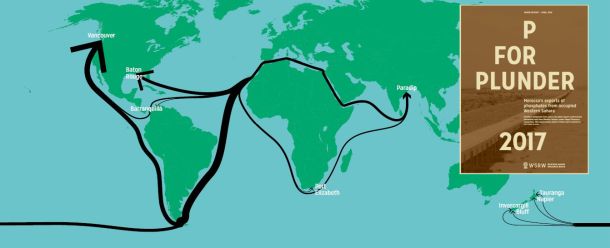
Our latest annual report on the phosphate trade from occupied Western Sahara shows that Mexico will soon take over India's role as the most important client of the territory's conflict mineral.
- UPDATE: The report P for Plunder 2022, originally posted on 6 April 2022, contained an error, suggesting that the company SwissMarine was operator of two vessels. SwissMarine has later documented that this information is incorrect. The error was removed from the publication on 21 Nov 2022. WSRW apologies for the mistake made.
- لقراءة هذا المقال بالعربية المرجو الضغط هنا
Today, Western Sahara Resource Watch (WSRW) publishes its ninth-in-a-row detailed, annual overview of the companies involved in the purchase of phosphates from occupied Western Sahara. The illegally exploited phosphate rock is one of the Moroccan government’s main sources of income from the territory it holds contrary to international law.

The list we present in this report is complete for the calendar year 2021, and thus includes all shipments of phosphates out of occupied Western Sahara. A total of 26 vessels departed the territory with 1.4 million tonnes of phosphate rock, an increase from the approx 1 million tonnes exported in 2019 and 2020. To compare, Morocco’s average export from the occupied territory during the years 2012-2018 was 1.8 million tonnes. A doubling of the phosphate prices during 2021 means the illegal exports are increasingly lucrative, perhaps corresponding to a value of 349 million USD for that year's exports.
The biggest client of the controversial trade in 2021 was India, as has been the case since 2019. However, this might change from now on.
In spite of earlier promises to no longer source phosphate rock from Western Sahara, the US company Innophos Holdings has resumed its imports from the occupied territory Sahara into Mexico. The company became the leading importer during the second half of 2021: from the arrival of the year's first shipment to Mexico on 2 August 2021 until the end of the year, Innophos took in 43% of all phosphate rock from occupied Western Sahara. The seven shipments that it received during the last five months of 2021 totalled 391.000 tonnes, outweighing any other importer involved in that same timeframe.
The report also shows:
- The imports to India, Mexico and New Zealand constitute over 92 percent of the entire trade in Western Sahara's phosphate rock.
- The good news for the year is that the Chinese company China Molybdenum has promised its investors it would not repeat imports to its subsidiary in Brazil.
- The Russian company EuroChem received local media attention when it carried out a shipment to Estonia in October - the first import of the controversial commodity into the EU in five years. It is positive that the company has not repeated the involvement since.
- In New Zealand, Ravensdown continues to explore ways to avoid Western Sahara rock, which is commendable. Ballance Agri-Nutrients shows the opposite trend, with the highest annual purchase since WSRW started daily monitoring in 2011.
As WSRW wrote yesterday, Morocco has during over the last year carried out large investments in the port and in the Boucraa facilities. Since the occupation began in 1975, Morocco has only sold raw phosphate rock. In a few years from now, the phosphates will also be sold in a more valuable, processed form. This wider product range will further increase the lucrative trade.
Ever since vessels transporting Western Saharan phosphate were detained in Panama and South Africa in 2017, no shipments have gone via Cape of Good Hope or through the Panama Canal.
WSRW calls on all companies involved in the trade to immediately halt all purchases and all shipments of Western Sahara phosphates until a solution to the conflict has been found. Investors are requested to engage or divest unless action is taken.
Previous editions of the P for Plunder series can be found here.
The Saharawi people have been consistently outspoken against the trade, both in the UN, generally, and to specific companies.
Since you're here....
WSRW’s work is being read and used more than ever. We work totally independently and to a large extent voluntarily. Our work takes time, dedication and diligence. But we do it because we believe it matters – and we hope you do too. We look for more monthly donors to support our work. If you'd like to contribute to our work – 3€, 5€, 8€ monthly… what you can spare – the future of WSRW would be much more secure. You can set up a monthly donation to WSRW quickly here.
New report: Western Sahara phosphate trade halved
The export of phosphate rock from occupied Western Sahara has never been lower than in 2019. This is revealed in the new WSRW report P for Plunder, published today.
New report on Western Sahara phosphate industry out now
Morocco shipped 1.93 million tonnes of phosphate out of occupied Western Sahara in 2018, worth an estimated $164 million, new report shows. Here is all you need to know about the volume, values, vessels and clients.
New report on contentious Western Sahara phosphate trade
Morocco shipped over 1.5 million tonnes of phosphate out of occupied Western Sahara in 2017, to the tune of over $142 million. But the number of international importers of the contentious conflict mineral is waning, WSRW's annual report shows.
New report on global phosphate trade from occupied Western Sahara
Over 200 million dollars worth of phosphate rock was shipped out of occupied Western Sahara last year, a new report from WSRW shows. For the first time, India is among the top importers.



